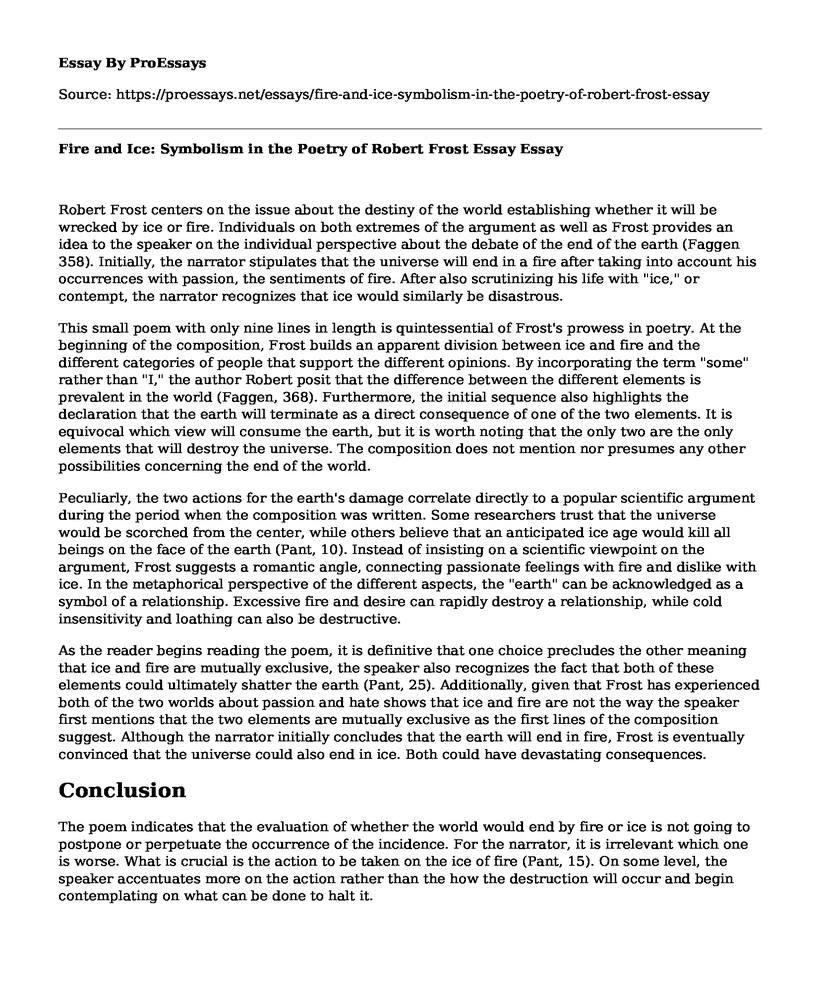Robert Frost centers on the issue about the destiny of the world establishing whether it will be wrecked by ice or fire. Individuals on both extremes of the argument as well as Frost provides an idea to the speaker on the individual perspective about the debate of the end of the earth (Faggen 358). Initially, the narrator stipulates that the universe will end in a fire after taking into account his occurrences with passion, the sentiments of fire. After also scrutinizing his life with "ice," or contempt, the narrator recognizes that ice would similarly be disastrous.
This small poem with only nine lines in length is quintessential of Frost's prowess in poetry. At the beginning of the composition, Frost builds an apparent division between ice and fire and the different categories of people that support the different opinions. By incorporating the term "some" rather than "I," the author Robert posit that the difference between the different elements is prevalent in the world (Faggen, 368). Furthermore, the initial sequence also highlights the declaration that the earth will terminate as a direct consequence of one of the two elements. It is equivocal which view will consume the earth, but it is worth noting that the only two are the only elements that will destroy the universe. The composition does not mention nor presumes any other possibilities concerning the end of the world.
Peculiarly, the two actions for the earth's damage correlate directly to a popular scientific argument during the period when the composition was written. Some researchers trust that the universe would be scorched from the center, while others believe that an anticipated ice age would kill all beings on the face of the earth (Pant, 10). Instead of insisting on a scientific viewpoint on the argument, Frost suggests a romantic angle, connecting passionate feelings with fire and dislike with ice. In the metaphorical perspective of the different aspects, the "earth" can be acknowledged as a symbol of a relationship. Excessive fire and desire can rapidly destroy a relationship, while cold insensitivity and loathing can also be destructive.
As the reader begins reading the poem, it is definitive that one choice precludes the other meaning that ice and fire are mutually exclusive, the speaker also recognizes the fact that both of these elements could ultimately shatter the earth (Pant, 25). Additionally, given that Frost has experienced both of the two worlds about passion and hate shows that ice and fire are not the way the speaker first mentions that the two elements are mutually exclusive as the first lines of the composition suggest. Although the narrator initially concludes that the earth will end in fire, Frost is eventually convinced that the universe could also end in ice. Both could have devastating consequences.
Conclusion
The poem indicates that the evaluation of whether the world would end by fire or ice is not going to postpone or perpetuate the occurrence of the incidence. For the narrator, it is irrelevant which one is worse. What is crucial is the action to be taken on the ice of fire (Pant, 15). On some level, the speaker accentuates more on the action rather than the how the destruction will occur and begin contemplating on what can be done to halt it.
Works Cited
Faggen, Robert. "Robert Frost." A Companion to Modernist Poetry (2014): 358-366.
Pant, Kavita Pandey. "Symbolism in the Poetry of Robert Frost." Asian Journal of Multidisciplinary Studies 4.7 (2016).
Cite this page
Fire and Ice: Symbolism in the Poetry of Robert Frost Essay. (2022, May 17). Retrieved from https://proessays.net/essays/fire-and-ice-symbolism-in-the-poetry-of-robert-frost-essay
If you are the original author of this essay and no longer wish to have it published on the ProEssays website, please click below to request its removal:
- Paper Example on Overall Value of George Orwell's 1984 in the Contemporary World
- Response to Maus' Interpretation of Shakespearean Comedy Essay
- The Valley of Love Essay
- Essay Sample on Rethinking Modernism
- Sustainable Wooden Doors: 3 Principles for Long Term Use - Essay Sample
- Essay Example on Social Media: A Growing Hub for Hackers & Crime
- Essay Sample on Humans' Neural Musical Process: Ability in the Womb







